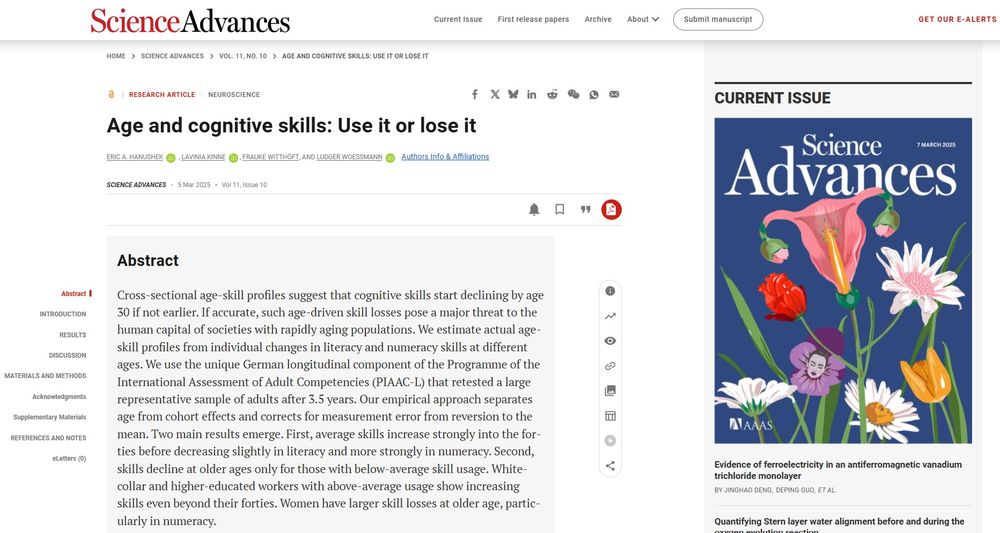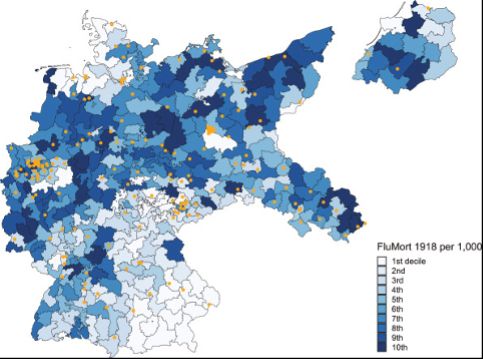🚨 Thrilled that our 🆕 paper
“Age and Cognitive Skills: Use It or Lose It”
just came out in #ScienceAdvances @science.org
💡 Longitudinal evidence: age pattern of literacy+numeracy not as bleak as cross-section suggests + strongly differs by skill usage
www.science.org/doi/full/10....
🧵A thread
1/7
“Age and Cognitive Skills: Use It or Lose It”
just came out in #ScienceAdvances @science.org
💡 Longitudinal evidence: age pattern of literacy+numeracy not as bleak as cross-section suggests + strongly differs by skill usage
www.science.org/doi/full/10....
🧵A thread
1/7

Mechanisms II: Why was SPD believed to have expertise in public health? In contrast to other parties, SPD and its predecessors explicitly addressed health policy in party programs; SPD particularly concerned with health of workers; SPD strongly involved in health insurance system
Mechanisms I: Not driven by populist and extremist parties; no evidence for punishing/rewarding incumbents; no by-product of dismal economic conditions after World War I. Results in line with issue ownership theory: voters reward competence in salient issues.
Validity & robustness checks: Parallel pre-trends ✅; city-level analysis: effect driven by deaths due to respiratory diseases ✅; robust to controlling for large set of covariates, incl., e.g., pre-War poverty, inequality, other mortality phenomena during World War I.✅
Effect size: Moving from a constituency at the 25th percentile of mortality to a constituency at the 75th percentile of the mortality distribution increased the left-wing vote share by 2.1 percentage points or 12.4 percent of a standard deviation. Effect is persistent.

Method and data: We exploit a panel of voting results containing 14 elections from 1893 to 1933 across all 362 constituencies of the German Empire and the Weimar Republic in a difference-in-differences design and combine this panel with a measure of Spanish flu mortality in 1918.

Background II: Still, since the pandemic killed around 400,000 people and public life was altered due to widespread sick leaves, the Spanish Flu was arguably salient to voters when elections were held in January 1919, just a month after the 2nd wave had flattened.
Background I: The deadly 2nd wave of the Spanish flu hit Germany in late 1918 during the crucial phase of World War I. As authorities did not want to raise concerns of the people, they rejected any interventions and did little to limit the spread of influenza
Take-home result: Excess mortality due to the Spanish Flu resulted in a lasting shift of votes towards left-wing parties in the Weimar Republic. Extremists could not benefit from pandemic. Mechanism: As public health became a salient issue, voters rewarded expertise in this issue
Thank you @danielkuehnle.bsky.social for inviting me to present my paper „The impact of Margaret Sanger‘s birth control clinics on early 20th century US fertility and mortality“ @unidue.bsky.social.
Super nice crowd, great comments - highly recommend!
www.wiwi.uni-passau.de/fileadmin/do...
Super nice crowd, great comments - highly recommend!
www.wiwi.uni-passau.de/fileadmin/do...
www.wiwi.uni-passau.de
Dazu ein schönes Portrait im Digitalen Forschungsmagazin der Uni Passau @unipassauresearch.bsky.social von @kathaimerl.bsky.social
www.digital.uni-passau.de/beitraege/20...
www.digital.uni-passau.de/beitraege/20...

Mit Algorithmen auf der Suche nach der bestmöglichen Entscheidung
Die "WirtschaftsWoche" hat Prof. Dr. Marc Goerigk von der Universität Passau zum forschungsstärksten BWL-Professor unter 40 Jahren gekürt. Woran er forscht und warum er das Abstrakte schöner findet al...
www.digital.uni-passau.de
Herzlichen Glückwunsch an meinen lieben Kollegen Marc Goerigk zum 1. Platz im BWL-Ranking U40 @wirtschaftswoche.bsky.social
🥳 wiwo.de/politik/konj...
🥳 wiwo.de/politik/konj...
WirtschaftsWoche
wiwo.de
Reposted by: Stefan Bauernschuster
German magazine @wirtschaftswoche.bsky.social has named a professor from our university as the most prolific young business economist in Germany - congratulations, Professor #MarcGoerigk 👏🙌 Learn more about his research and why he finds the abstract more beautiful than concrete problems:
Reposted by: Stefan Bauernschuster
It's that time of year again ❄️ icy conditions increase workplace accidents by 6.3%, especially among older workers. In this study to be published in the @jpube.bsky.social, @katharinad.bsky.social and @benjanz.bsky.social analyse the economic burden of extreme temperatures:
#econsky 🧪
#econsky 🧪

Heat causes increase in occupational accidents, study finds
A study conducted by Katharina Drescher from the University of Passau and Benedikt Janzen from the University of Bern based on data from Switzerland has revealed: On days when temperatures exceed thir...
www.digital.uni-passau.de
Memories of a great conference #eale2024 in Bergen 🇳🇴




Hier ist ein spannendes Papier, das zeigt, dass fest installierte Blitzer wirken, aber nur sehr lokal (Umkreis 500 Meter): www.dropbox.com/s/rupfe4rxqz...
www.dropbox.com
Toronto ❤️ Thank you for great discussions, Shari Eli, Michael Baker, Tianyi Wang, David Nagy, Devin Bissky Dziadyk and Stephan Heblich! Now preparing for the Urban Economics Association conference.




Looking forward to the annual meeting of the German Economic Association in Regensburg, in particular to seeing many new faces. Please, dear doctoral students, approach us „old“ professors - this is what conferences are made for!
Starting here with a few holiday pictures from Sardegna. May attract more people than my research.




